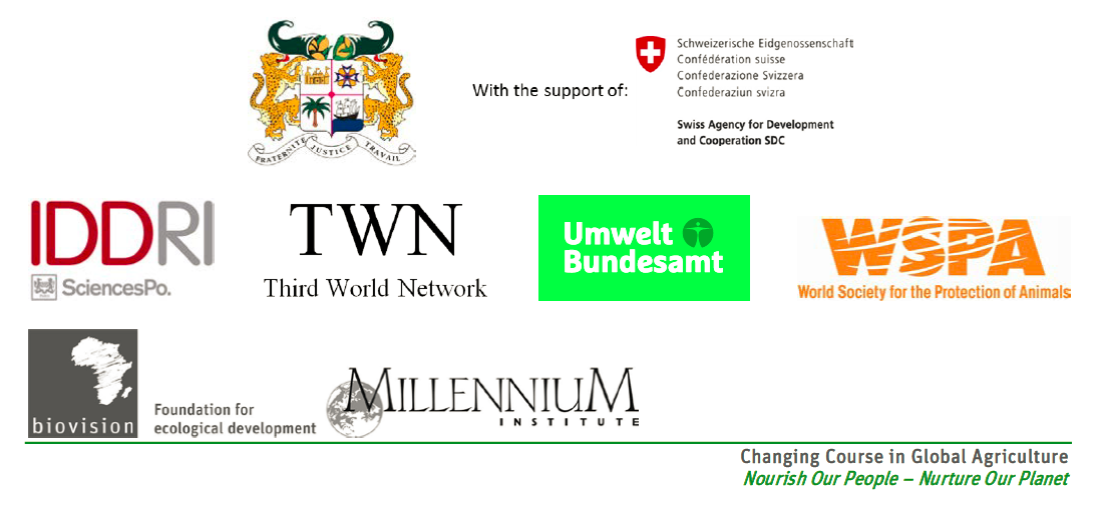 28 March 2014: Participants in the High-level Roundtable on ‘Food and Nutrition Security through Sustainable Agriculture and Food Systems in the post-2015 Agenda’ have issued a message titled ‘SHIFT: Food and Nutrition Security through Sustainable Agriculture and Food Systems in the Post-2015 Agenda.’ The event, convening in New York, US, on 27-28 March 2014, was hosted by the Government of Benin, Biovision Foundation, and the Millennium Institute, with support from the Swiss Agency for Development and Cooperation, the German Federal Environment Agency, IDDRI, the Third World Network and WSPA.
28 March 2014: Participants in the High-level Roundtable on ‘Food and Nutrition Security through Sustainable Agriculture and Food Systems in the post-2015 Agenda’ have issued a message titled ‘SHIFT: Food and Nutrition Security through Sustainable Agriculture and Food Systems in the Post-2015 Agenda.’ The event, convening in New York, US, on 27-28 March 2014, was hosted by the Government of Benin, Biovision Foundation, and the Millennium Institute, with support from the Swiss Agency for Development and Cooperation, the German Federal Environment Agency, IDDRI, the Third World Network and WSPA.
Participants included high-level representatives from governments, the UN System, research, civil society, farmers, and the private sector.
The message calls for “SHIFT” in the post-2015 development agenda and specifically a goal on Sustainable Agriculture, Food Security and Nutrition. SHIFT refers to five elements: Small-scale food producers empowered; Hunger and all forms of malnutrition ended, and full access to food ensured; Inclusiveness in decision-making on sustainable agriculture, food security and nutrition; Food systems established which are sustainable, diverse and resilient, less wasteful, restore soil fertility and halt land degradation; and Trade policies reshaped and food price volatility mitigated.
The message also includes seven proposed targets to be achieved by 2030: Secure year-round access to safe, adequate, nutritious and affordable food for all; End hunger and malnutrition in all its forms, with special attention to stunting; Ensure small-scale food producers, especially women and youth, have secure access to knowledge, productive resources and services to sustainably improve their livelihood, including income, productivity and resilience; Implement productive, resilient, and diverse sustainable agriculture and food systems that maintain and regenerate natural resources and ecosystems; Reverse land degradation through prevention and restoration; Halve the global rate of food losses and waste throughout the food supply chain; and Ensure markets are functioning and accessible for all, especially smallholders and women, through reshaping trade policies, including phasing-out export and other harmful subsidies, and measures to mitigate excessive food price volatility.
The roundtable’s message also suggested that climate, ecosystems and biodiversity, economic growth, gender equality, health, infrastructure, means of implementation, oceans sustainable consumption and production, urbanization and water be included in other focus areas of the post-2015 agenda.
In addition, it notes that guiding and monitoring of the implementation of the post-2015 agenda related to food and nutrition security and sustainable agriculture and food systems, can best be provided by the Committee on World Food Security (CFS).
Discussions during the two-day event covered/highlighted: the integration of the issue with other thematic areas; the transformation needed in the agricultural sector; the livelihoods of small-holder farmers; the challenges of food production and access; the need to craft limited and concise targets; and the availability of data for measurement. Participants considered how to balance the multiple, detailed ideas for target areas with the need for a goal that everyone can understand. Debate also centered on how to craft a goal and targets that are “transformative” and that provide the right signals and incentives to change behavior in the economic sector.
The agreed recommendations from the Roundtable will be submitted to the co-chairs of the UN General Assembly’s Open Working Group (OWG) on Sustainable Development Goals (SDGs). A meeting report also is being prepared by the co-hosts and organizers, detailing discussions of the issues presented in the Message. [IISD RS Sources] [High-level Roundtable Website] [Biovision Press Release] [Outcome Message]